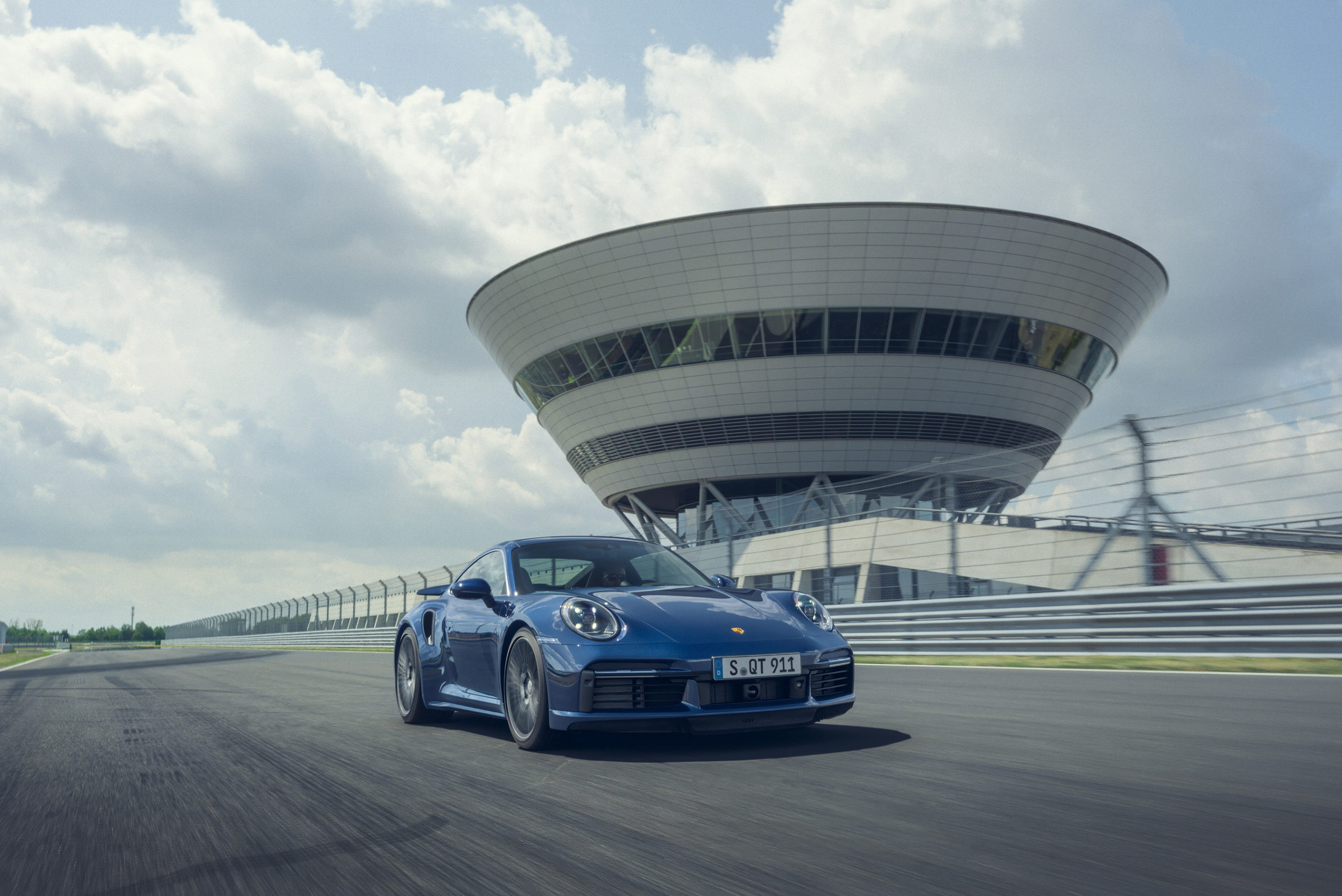Following the recent introduction of the 2021 911 Turbo S, the 2021 911 Turbo Coupe and Cabriolet are now making their debut, Porsche has announced.
Thanks to an output of 572 hp, marking an increase of 32 hp over the predecessor, the new 911 Turbo accelerates from 0 to 60 mph in 2.7 seconds (0.2 seconds faster than before) while the new 911 Turbo Cabriolet takes 2.8 seconds (also 0.2 seconds faster). The acceleration, power output and torque (553 lb.-ft.) of the new 911 Turbo are on the level of the previous 2019 911 Turbo S.
Like the 2021 911 Turbo S, the twin-turbo boxer engine in the 911 Turbo models is mated to a standard eight-speed PDK transmission with Turbo-specific internals and calibration. The top track speed of the new 911 Turbo models is 198 mph. New options such as a Sport and Lightweight package, Sport Suspension with a lower ride height and Sport Exhaust system, first introduced for the 911 Turbo S, are also available for the 911 Turbo for the first time.
Like the recently introduced 2021 911 Turbo S, the six-cylinder boxer engine in the new 911 Turbo has a displacement of 3,745 cc and now features symmetrical VTG turbochargers with electrically controlled bypass valves. In conjunction with the redesigned charge air cooling system and the use of piezo fuel injectors, this improves throttle response, performance, torque delivery and the free revving nature of the engine. In the Turbo models, this engine makes 572 hp. Complementing the increase in power, the chassis has been tuned to offer an even greater level of performance.
Adopting the changes implemented on the new 911 Turbo S earlier this year, steering response and precision on the new 911 Turbo models have been further improved thanks to an additional 1.65 inches of front track width and the new 20-inch 255/35 tires (up from 245/35 previously). Also shared with the 2021 911 Turbo S, the Porsche Traction Management (PTM) active all-wheel drive system in the 911 Turbo is able to transfer even more power to the front wheels than before. Traction at the rear axle, which is equipped with rear-axle steering as standard, is increased even further by 0.39 inches of added track width compared to the last 911 Turbo, as well as 315/30 tires on 21-inch wheels (305/30 R 20 previously). The revamped brake system is even larger than on the last 911 Turbo and can be recognized by the red fixed calipers. The front cast iron brake rotors now measure 408 millimeters in diameter (28 mm larger than the previous 911 Turbo) and are 36 millimeters thick (plus 2 mm). The rear axle features 380-millimeter brake rotors that are 30 millimeters thick. Porsche Ceramic Composite Brakes (PCCB), standard on the 911 Turbo S, with 10-piston front calipers, are available as an option.
A Sport Exhaust system that was introduced on the 2021 911 Turbo S is also optionally available for the 911 Turbo for the very first time. Two different suspension options are also new: while the standard PASM suspension offers a greater spread between agility and ride comfort than before, the particularly performance oriented, electronically controlled PASM Sport Suspension with a 0.39 inch (10 mm) lower ride height compared to the standard suspension benefits the agility of the new 911 Turbo even further with a set-up aimed at further enhancing driving dynamics. Porsche Dynamic Chassis Control (PDCC), which uses active anti-roll stabilization, is available as an option for the 911 Turbo models.
Shared with the 2021 911 Turbo S, the body of the new 911 Turbo models is 1.8 inches wider than the predecessor at the front fenders to accommodate the increase in track width and tire size compared to the previous model. LED headlights with PDLS Plus are fitted as standard. At the rear axle, the body is now 0.78 inches wider than the previous generation 911 Turbo (991), also to accommodate wider track and tires. Other distinguishing features of the new 911 Turbo are the enhanced adaptive aerodynamics with controlled cooling air flaps at the front, a larger active front spoiler and the significantly increased size of the active rear spoiler. The air intakes on the rear side panels, characteristic for the 911 Turbo, now draw in process air rather than cooling air. The charge air coolers are now positioned directly in the air stream under the rear decklid. The continuous light bar with LED tail lights as well as the new louvered rear decklid grille with silver trim strips round off the design of the rear end.
The appearance and performance of the vehicle can be additionally altered by the optional Lightweight package and Sport package. The Lightweight package for the coupe reduces the vehicle’s weight by about 66 pounds. Full Bucket seats, no rear seats and reduced sound insulation contribute to the weight savings and allow the exhaust note to enter the cabin more intensely. The Sport package encompasses all the elements of the SportDesign package as well as additional applications in Black, carbon fiber elements and Exclusive Design clear taillights.
The basic elements of the 911 Turbo interior correspond to those of the current 911 Carrera models with Porsche Advanced Cockpit and Direct Touch Control. The 10.9-inch Porsche Communication Management (PCM) center screen can be operated quickly. The extensive list of standard equipment includes electrically adjustable 14-way Sport seats, the Sport Chrono package, a GT Sport steering wheel with shift paddles and mode switch as well as the BOSE Surround Sound System. Numerous options are available, including Porsche InnoDrive with adaptive cruise control, Lane Keep Assist with traffic sign recognition, Night Vision Assist, Surround View and a Burmester High-End Surround Sound System.
